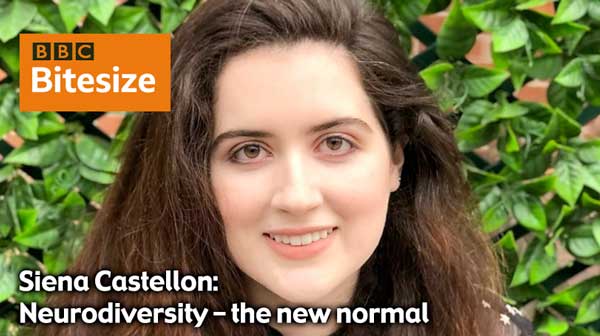Siena Castellon: Neurodiversity – the new normal
Siena is 17 and from London. She classes herself as a ‘maths and physics nerd’ and claims her dog is the cutest dog in the world. Siena is also neurodiverse: She is autistic, dyslexic, dyspraxic and has ADHD.
We caught up with Siena – who is also an award-winning advocate for neurodiversity, an author, a student and the founder of the ‘Neurodiversity Celebration Week‘ – to talk about what being neurodivergent means to her.
How would you describe your neurodiversity?
I describe my autism as a condition that makes social interaction and social communication challenging for me. Although I am eloquent in expressing myself, I have difficulties in interpreting social situations, such as people’s intentions and motivations.
I describe my dyslexia as a condition that affects my spelling and ability to read.
I describe my ADHD as a condition that primarily affects my ability to focus.
I describe my dyspraxia as a motor coordination disorder that means I am clumsy and terrible at sports.
Share This Post:









I think I understand what Siena wrote.
We are all, as humans different to each other. There are also different types of humans that have differences for different reasons. These reasons could be for enabling humanity to achieve different things and for the survival and education of humanity. Natural selection makes no distinction between what humans want and what they don’t want for we are all born as we are and we use what we’re given. We may not like some things about what we are. We may like some things about what we are. The important point here is that there is no ‘all normal’ or ‘all abnormal’ relating to any human being. There are human derived measures of social norms, relating to the concept of behaviour patterns and some of these measures are purportedly designed to ensure continuance of the best of human behaviour and to intervene when behaviour is not acceptable. Humans are in no position to explain the complexity of the universe at present in its entirety and therefore we are unable to make a correct assumption regarding who is normal and who isn’t-if such a concept exists. There is, however, a better measure relating to behaviour patterns that can be applied- not to the concept of normality of behaviour but to the concept of the morality of behaviour. Where would a trajectory of an erroneous social theory of normality lead us? Morality is the guide of normality. If we want to have a new normal, morality is the key to unlocking it. To make good morality and good behaviour the norm. To make kind behaviour the norm. To make compassionate behaviour the norm. If people’s intentions and motivations were good we wouldn’t need to worry if we didn’t interpret them correctly. In addition, I think that there should be a more differently correlated approach to the understanding of social norms, since group knowledge, common knowledge and beliefs are not always correct and therefore do require corrective ideas in the form of a more individual perspective, unmarried by the socially conditioned society. In addition, it is important that humanity learns and maintains kindness, understanding and compassion and, to illustrate my point, there is evidence to suggest that a social gathering or social belief, sometimes instigated by a certain type of individual, can lead to an exponential upward trajectory of unwanted, unkind, collective behaviour. Some people are not as influenced by social conditioning and collective erroneous beliefs.
Although some people, such as autistic people, may feel as though they are
NOT DESIGNED
for this planet and therefore find it more difficult than some other people to be here, autistic people who are sometimes thought of as being not normal and as having a defect, do often feel that they are
DESIGNED FOR SOMETHING
relating to this planet, whether that be to teach people to love and be kind and compassionate, or as Siena describes-analyzing, systemizing, discerning patterns and details is the way many think and this is useful to humanity.
Thus she is passionate to want people to understand that although some people find this planet difficult, that is not a reason for other people to be unkind to them and to bully them, they have things to give and things to teach.
We have ambitions and dreams.
I also have difficulties interpreting people’s intentions and motivations which, sadly, has led me into dangerous situations with dangerous people.
I have also been bullied most of my life and often told to make more effort and not be so different or weird.
After my diagnosis I have only received more understanding from educational establishments. Everywhere else and people anywhere else, have not usually been understanding or kind. Family tell me ‘you don’t have a neurodevelopmental difference, you’re just making excuses, you want people to feel sorry for you’ and at the same time they ostracise me and bully me.
We are all ON this planet but we are NOT THE PLANET, we also belong to the universe which is not fully understood.